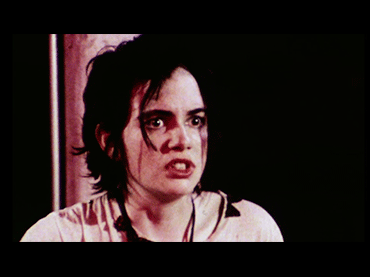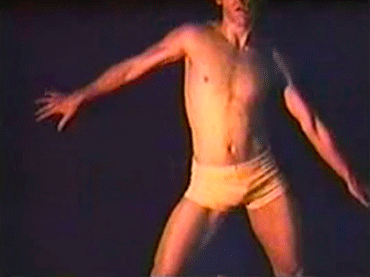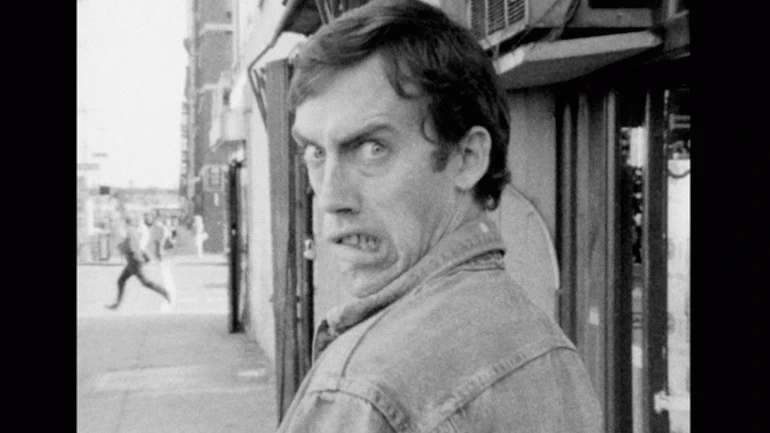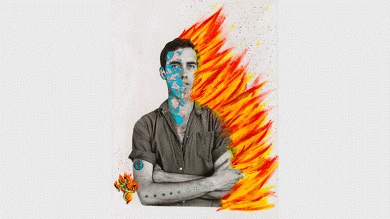-
Screening one: Thursday, 4 July – 7pm / Screening two: Thursday, 11 July – 7pm
Session 1
Images of Transgression
Kirsten Bates and Allen Frame. Turmoil in the Garden
USA, 1983, colour, original version in English with Spanish subtitles, video, 38’
Script: an adaptation of Sounds in the Distance, by David Wojnarowicz
Cast: Allen Frame, Tara Kelly, Nan Goldin, Kirsten Bates, Elisabeth Walker, Bill Rice, Brian Burchill, Suzanne Fletcher, Frank Franca.Richard Kern. Manhattan Love Suicides: Stray Dogs
USA, 1985, b/w, original version in English with Spanish subtitles, Super8 transferred to digital, 12’
Cast: Montanna Houston, Robin Renzi, Bill Rice and David Wojnarowicz
Music: J.G. ThirlwellRichard Kern. You Killed Me First
USA, 1985, colour, original version in English with Spanish subtitles, Super8 transferred to digital, 12’
Cast: David Wojnarowicz, Nick Cooper, Jessica Craig-Martin, Karen Finley, Montana Houston, Lung Leg
Music: J.G. ThirlwellDavid Wojnarowicz and Tommy Turner. Where Evil Dwells
USA, 1985, b/w, original version in English with Spanish subtitles, video, 31’
Cast: Joe Coleman, Devil Doodie, Richard Klemann, Lung Leg, Jack Nantz, Rockets Redglare, Tommy Turner, Charlotte Webb, Scott Werner, David Wojnarowicz
Music: AC/DC, J.G. Thirlwell and Wiseblood.Tom Rubnitz. Listen to This
USA, 1992, colour, original version in English with Spanish subtitles, video, 16’
Cast: David WojnarowiczThis first session is presented by artist, researcher and writer Alan W. Moore. A key component of New York’s punk scene and an activist in the 1970s and 1980s, he is a member of groups and platforms such as ABC No Rio, Colab and MWF Video Club, and the author of books that include Art Gangs: Protest and Counterculture in New York City (2011) and Occupation Culture: Art and Squatting in the City from Below (2015).
Turmoil in the Garden is a theatrical production with monologues adapted from David Wojnarowicz’s first book, Sounds in the Distance (1982). The texts are an example of artistic ethnography and describe a life of survival on the streets of New York, listening to and recording marginal figures Wojnarowicz dealt with in his experiences as a male prostitute. The work, with echoes of Jean Genet and Tennessee Williams, is performed by friends of the artist, for instance Nan Goldin, Frank Franca, Allen Frame and Elizabeth Walker. In Manhattan Love Suicides, Wojnarowicz plays a stalker compulsively in love with a man he meets randomly on the street, and who turns out to be an artist, played by Bill Rice. You Killed Me First is the story of a dysfunctional, repressive family and its children, one of which is played by Sonic Youth and Cinema of Transgression muse, Lung Leg, who has reached breaking point. Wojnarowiz plays an abusive and authoritarian father, drawing on his own autobiographical experience. Where Evil Dwells explores a traumatic crime from that period: the murder of a teenager by his teenage friend, Ricky Kasso, who was under the influence of drugs and the alleged satanic occultism alluded to in heavy metal, music which marks the pulse and rhythm of the film. For Wojnarowicz, Ricky Kasso was the leader of a dark and repressed America, “a kind of Ronald Reagan”, as he would write in his memoir. Finally, in Listen to This Wojnorawicz plays an executive who, from his office, delivers a tirade against the situation of the homosexual artist in American society, interspersing images of contemporary culture – a short film demonstrating the power of Wojnarowicz as a symbol and social model, his fiery response against venomous backlash and the US Government’s failure to act during the AIDS crisis.

-
Screening one: Sunday, 7 July – 5pm / Screening two: Sunday, 14 July – 5pm
Session 2
Melancholia and Moralism
David Wojnarowicz and Phil Zwickler. Fear of Disclosure
USA, 1989, colour, original version in English with Spanish subtitles, video, 5’David Wojnarowicz and Ben Neill. ITSOFOMO (In the Shadow of Forward Motion)
USA, 1991, colour, original version in English with Spanish subtitles, video, 49’. Originally presented at The Kitchen, New York, in 1989.In his essay Melancholia and Moralism, Douglas Crimp acknowledges the importance of mourning and lamentation over loss, producing an artistic and theoretical manifestation which responds to the devastating effects of AIDS. To that end, the session sets out from this elegiac and poetic response, in which two experimental, queer works speak of the future of medicated lives, the fear of infection and the disappearance of the body with a semi-wakeful tone encapsulating the disease that ravaged a whole generation and would ultimately end David Wojnarowicz’s life aged just 37. Fear of Disclosure was first screened at the New York Lesbian and Gay Experimental Film Festival in 1989; in this short video, partying and club culture becomes an epigram on sexual encounters after infection. In the words of the film-makers, it constitutes “an exploration of the act of disclosing to a potential lover that you’re HIV positive, the virus believed to cause AIDS. Two go-go dancers at New York’s Pyramid Club jump and rub against each other while they recognise their own mortality”. ITSOFOMO, the second work, is a disturbing and visceral multimedia piece, conceived as a live performance and adapted here in a screening which combines Wojnarowicz’s writing, the sound improvisation of composer Ben Neill and the images the former repeatedly used as symbols and allegories. ITSOFOMO refers to the consequences of “acceleration”, a term the artists discovered reading the work of French theorist Paul Virilio and his criticism, in natural time, of contemporary capitalism. Both would apply the term to the immediacy with which AIDS was wiping out bodies and erasing a story of resistance and the fight for equality.


Held on 04, 05, 09, 12 Jul 2019
Inside the framework of the exhibition David Wojnarowicz. History Keeps Me Awake at Night (running until 30 September 2019), this series presents the post-punk and trash experiences that resulted from the film collaborations of artist David Wojnarowicz (New Jersey, USA, 1954 – New York, USA, 1992) with New York’s East Village art community in the 1980s. The programme, comprising two double sessions, features the work of Richard Kern, Tommy Turner, Kirsten Bates, Allen Frame, Ben Neill and Phil Zwickler, artists for whom life on the edge was a way to express their keen sense of rage and discontent with the sexual moralism and complaisance that pervaded the USA across that decade.
The title of the series, ‘deathtripping’, is in reference to a term writer Jack Sargeant used to characterise the underground film experiences in New York in the 1980s, in the book Deathtripping. The Cinema of Transgression (1995). Moreover, this expression condenses the ambivalence gathered in the series, for instance the sexual vitalism of the gay community in opposition to the thanatological paranoia AIDS produced, or moral freedom on the margins of consent in opposition to the rage against a society which only tolerated such freedom while it remained precarious and out of sight.
Across two highly divergent sessions, the series surveys these dilemmas between violence and autonomy, destruction and love. In the first, searing and parodic works are displayed, acerbically distilling a profound non-conformity with the American way of life and united in fiction through the most violent protests against the system, from serial killers to massacres meted out randomly among the population — as Wojnarowicz wrote, behind the sheen of the American dream is the “killing machine called America”. The second session, meanwhile, leaves these iconoclastic and transgressive gestures to one side, reflecting instead on loss and mourning with Fear of Disclosure and ITSOFOMO, two works lying between performance, multimedia installation and expanded cinema. In both, David Wojnarowicz’s writing, live music and fragmentary and elusive images compose a mood which masterfully encapsulates a time of anger and melancholia.
Curatorship
Alan Moore and Chema González
Acknowledgements
Collaborative Projects, Inc.
Organised by
Museo Reina Sofía
Más actividades
![Tracey Rose, The Black Sun Black Star and Moon [La luna estrella negro y negro sol], 2014.](https://recursos.museoreinasofia.es/styles/small_landscape/public/Obra/AD07091_2.jpg.webp)
On Black Study: Towards a Black Poethics of Contamination
Monday 27, Tuesday 28 and Wednesday 29 of April, 2026 – 16:00 h
The seminar On Black Study: Towards a Black Poethics of Contamination proposes Black Study as a critical and methodological practice that has emerged in and against racial capitalism, colonial modernity and institutional capture. Framed through what the invited researcher and practitioner Ishy Pryce-Parchment terms a Black poethics of contamination, the seminar considers what it might mean to think Blackness (and therefore Black Study) as contagious, diffuse and spreadable matter. To do so, it enacts a constellation of diasporic methodologies and black aesthetic practices that harbor “contamination” -ideas that travel through texts, geographies, bodies and histories- as a method and as a condition.
If Blackness enters Western modernity from the position of the Middle Passage and its afterlives, it also names a condition from which alternative modes of being, knowing and relating are continually forged. From within this errant boundarylessness, Black creative-intellectual practice unfolds as what might be called a history of touches: transmissions, residues and socialities that unsettle the fantasy of pure or self-contained knowledge.
Situated within Black radical aesthetics, Black feminist theory and diasporic poetics, the seminar traces a genealogy of Black Study not as an object of analysis but as methodological propositions that continue to shape contemporary aesthetic and political life. Against mastery as the horizon of study, the group shifts attention from what we know to how we know. It foregrounds creative Black methodological practices—fahima ife’s anindex (via Fred Moten), Katherine McKittrick’s expansive use of the footnote, citation as relational and loving labour, the aesthetics of Black miscellanea, and Christina Sharpe’s practices of annotation—as procedures that disorganise dominant regimes of knowledge. In this sense, Black Study is approached not as a discrete academic field but as a feel for knowing and knowledge: a constellation of insurgent practices—reading, gathering, listening, annotating, refusing, world-making—that operate both within and beyond the university.
The study sessions propose to experiment with form in order to embrace how ‘black people have always used interdisciplinary methodologies to explain, explore, and story the world.’ Through engagements with thinkers and practitioners such as Katherine McKittrick, C.L.R. James, Sylvia Wynter, Christina Sharpe, Fred Moten, Tina Campt, Hilton Als, John Akomfrah, fahima ife and Dionne Brand, we ask: What might it mean to study together, incompletely and without recourse to individuation? How might aesthetic practice function as a poethical intervention in the ongoing work of what Sylvia Wynter calls the practice of doing humanness?

Intergenerationality
Thursday, 9 April 2026 – 5:30pm
This series is organised by equipoMotor, a group of teenagers, young people and older people who have participated in the Museo Reina Sofía’s previous community education projects, and is structured around four themed blocks that pivot on the monstrous.
The third session gazes at film as a place from which to dismantle the idea of one sole history and one sole time. From a decolonial and queer perspective, it explores films which break the straight line of past-present-future, which mix memories, slow progress and leave space for rhythms which customarily make no room for official accounts. Here the images open cracks through which bodies, voices and affects appear, disrupting archive and questioning who narrates, and from where and for whom. The proposal is at once simple and ambitious: use film to imagine other modes of remembering, belonging and projecting futures we have not yet been able to live.

Remedios Zafra
Thursday March 19, 2026 - 19:00 h
The José Luis Brea Chair, dedicated to reflecting on the image and the epistemology of visuality in contemporary culture, opens its program with an inaugural lecture by essayist and thinker Remedios Zafra.
“That the contemporary antifeminist upsurge is constructed as an anti-intellectual drive is no coincidence; the two feed into one another. To advance a reactionary discourse that defends inequality, it is necessary to challenge gender studies and gender-equality policies, but also to devalue the very foundations of knowledge in which these have been most intensely developed over recent decades—while also undermining their institutional support: universities, art and research centers, and academic culture.
Feminism has been deeply linked to the affirmation of the most committed humanist thought. Periods of enlightenment and moments of transition toward more just social forms—sustained by education—have been when feminist demands have emerged most strongly. Awareness and achievements in equality increase when education plays a leading social role; thus, devaluing intellectual work also contributes to harming feminism, and vice versa, insofar as the bond between knowledge and feminism is not only conceptual and historical, but also intimate and political.
Today, antifeminism is used globally as the symbolic adhesive of far-right movements, in parallel with the devaluation of forms of knowledge emerging from the university and from science—mistreated by hoaxes and disinformation on social networks and through the spectacularization of life mediated by screens. These are consequences bound up with the primacy of a scopic value that for some time has been denigrating thought and positioning what is most seen as what is most valuable within the normalized mediation of technology. This inertia coexists with techno-libertarian proclamations that reactivate a patriarchy that uses the resentment of many men as a seductive and cohesive force to preserve and inflame privileges in the new world as techno-scenario.
This lecture will address this epochal context, delving into the synchronicity of these upsurges through an additional parallel between forms of patriarchal domination and techno-labor domination. A parallel in which feminism and intellectual work are both being harmed, while also sending signals that in both lie emancipatory responses to today’s reactionary turns and the neutralization of critique. This consonance would also speak to how the perverse patriarchal basis that turns women into sustainers of their own subordination finds its equivalent in the encouraged self-exploitation of cultural workers; in the legitimation of affective capital and symbolic capital as sufficient forms of payment; in the blurring of boundaries between life and work and in domestic isolation; or in the pressure to please and comply as an extended patriarchal form—today linked to the feigned enthusiasm of precarious workers, but also to technological adulation. In response to possible resistance and intellectual action, patriarchy has associated feminists with a future foretold as unhappy for them, equating “thought and consciousness” with unhappiness—where these have in fact been (and continue to be) levers of autonomy and emancipation.”
— Remedios Zafra

ARCO2045. The Future, for Now
Saturday 7, March 2026 - 9:30pm
The future, its unstable and subjective nature, and its possible scenarios are the conceptual focus of ARCOmadrid 2026. A vision of the future linked to recent memory, a flash of insight into a double-edged sword. This year's edition, as in the previous two, will once again hold its closing party at the Reina Sofia Museum. This time, the star of the show is Carles Congost (Olot, Girona, 1970), one of the artists featured in the new presentation of the Collections recently inaugurated on the 4th floor of the Sabatini Building.
Carles Congost, with his ironic and timeless gaze, is responsible for setting the tone for this imperfect future, with a DJ session accompanied by some of his works in the Cloister on the first floor of the Sabatini Building of the Museo on the night of Saturday 7 March.

27th Contemporary Art Conservation Conference
Wednesday, 4, and Thursday, 5 March 2026
The 27th Contemporary Art Conservation Conference, organised by the Museo Reina Sofía’s Department of Conservation and Restoration, with the sponsorship of the Mapfre Foundation, is held on 4 and 5 March 2026. This international encounter sets out to share and debate experience and research, open new channels of study and reflect on conservation and the professional practice of restorers.
This edition will be held with in-person and online attendance formats, occurring simultaneously, via twenty-minute interventions followed by a five-minute Q&A.
